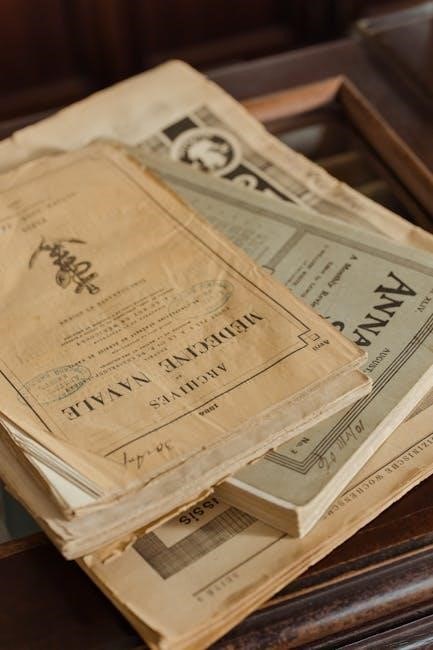books on world history pdf
World history books in PDF format offer convenient access to comprehensive narratives, spanning ancient civilizations to modern events, enabling learners to explore global timelines digitally.
1.1 Overview of Popular World History Books Available in PDF
Popular world history books in PDF format include works like “A Short History of the World” by H.G. Wells, “The Outline of History” by H.G. Wells, and “A Study of History” by Arnold Toynbee. These texts provide comprehensive narratives, covering ancient civilizations, empires, and modern events. Additionally, authors like E.H. Gombrich and Norman Lowe offer engaging perspectives, making world history accessible to readers worldwide.
1.2 Benefits of Reading World History in Digital Format
Reading world history in digital format offers unparalleled convenience and accessibility. PDF books are easily downloadable, allowing readers to access vast historical knowledge anytime, anywhere. Digital texts are searchable, enabling quick reference to specific events or themes. Additionally, PDFs are often free or low-cost, making world history accessible to a global audience. This format also supports interactive learning, with features like bookmarks and annotations, enhancing the educational experience for students and enthusiasts alike.

Popular and Influential Books on World History
Renowned authors like H.G. Wells, Arnold Toynbee, and E.H. Gombrich have shaped global historical narratives. Their works, such as “A Short History of the World” and “A Study of History,” are widely acclaimed. These books provide in-depth insights into civilizations, empires, and cultural evolutions, making them essential reads for understanding the complexities of world history. Their digital availability in PDF format ensures accessibility for modern learners and researchers.
2.1 “A Short History of the World” by H. G. Wells
H.G. Wells’ “A Short History of the World” is a concise yet comprehensive account of global history, tracing human progress from ancient civilizations to modern times. First published in 1922, this seminal work remains a foundational text for understanding the interconnectedness of cultures and empires. Its accessible narrative style and broad scope make it a popular choice for both casual readers and scholars. Available in PDF format, it continues to inspire curiosity about humanity’s shared past.
2.2 “The Outline of History” by H. G. Wells
H.G. Wells’ “The Outline of History” is a monumental work that chronicles the entirety of human history, from prehistoric times to the early 20th century. First published in 1920, this ambitious narrative seeks to unify historical knowledge into a single, coherent framework. Its detailed yet accessible style has made it a classic in historical literature, providing readers with a broad understanding of the world’s development. Available in PDF, it remains a valuable resource for students and history enthusiasts alike.
2.3 “A Study of History” by Arnold Toynbee
Arnold Toynbee’s “A Study of History” is a groundbreaking ten-volume analysis exploring the rise and fall of civilizations. First published between 1934 and 1961, it examines the development of societies through challenges and responses, offering a comparative perspective on global history. This monumental work is renowned for its depth and scope, providing insights into the evolution of cultures, religions, and societies. Available in PDF, it remains a seminal text for historians and scholars.

Books by Influential Authors
Influential authors like E.H. Gombrich and Norman Lowe have shaped our understanding of world history through their comprehensive and insightful writings, now accessible in PDF formats online.
3.1 Works by E.H. Gombrich
E.H. Gombrich’s works, such as A Little History of the World, offer a concise yet profound exploration of global history, spanning 40 chapters. His writing is renowned for its clarity and engaging narrative style, making complex historical events accessible to readers of all ages. These books are widely acclaimed for their academic rigor and popularity, providing a foundational understanding of world history in an approachable manner. They remain essential resources for both students and enthusiasts.
3.2 Contributions of Norman Lowe to World History Literature
Norman Lowe’s works, such as Mastering World History, are highly regarded for their clarity and depth, making them invaluable for students and researchers. His books provide a detailed yet accessible overview of global events, emphasizing key themes and connections. Lowe’s contributions are particularly noted for their utility in competitive exams like UPSC, offering structured insights into historical patterns and developments. His writing bridges academic rigor with readability, enhancing the study of world history for diverse audiences.

Resources for Downloading World History Books in PDF
Popular platforms offer free and paid PDF downloads of world history books, including Times Atlas of World History and Mastering World History by Norman Lowe.
4.1 Websites Offering Free PDF Downloads
Websites like Obooko, Google Books, and Project Gutenberg provide free PDF downloads of world history books. Obooko offers diverse topics, while Google Books includes previews and full texts. Project Gutenberg houses classic works, and platforms like ManyBooks and PDF Drive also offer extensive collections. These sites are invaluable for accessing historical texts without cost, catering to students and enthusiasts alike. Academic platforms further enhance access to open educational resources.
4;2 Academic Platforms Providing Open Educational Resources
Academic platforms like OpenStax and the Open Education Consortium offer high-quality, peer-reviewed world history textbooks in PDF format. These resources are designed for educational use, often developed by experts and aligned with curriculum standards. For instance, World History: Cultures, States, and Societies to 1500 is a popular open-access textbook available for free download. These platforms ensure accessibility, affordability, and academic rigor for students and researchers worldwide.

Academic and Educational Use of World History PDF Books
World history PDF books are widely used in education, offering students and researchers accessible, detailed resources for studying global timelines, events, and cultural developments comprehensively.
5.1 Textbooks for Students and Researchers
World history PDF textbooks provide students and researchers with comprehensive, accessible resources. Books like A Short History of the World and World History: Cultures, States, and Societies to 1500 offer detailed historical narratives, covering ancient civilizations to modern times. These texts are often available as Open Educational Resources, ensuring free access for academic purposes; They are structured to provide foundational knowledge, making them invaluable for undergraduates and those preparing for competitive exams like the UPSC, while also supporting advanced research in historical studies.
5.2 Open-Access Textbooks on World History
Open-access textbooks on world history are freely available, offering high-quality educational resources to students and educators. These texts, like World History: Cultures, States, and Societies to 1500, are licensed under Creative Commons, allowing unrestricted use and sharing. They provide comprehensive coverage of global history, from ancient times to the modern era, and are designed to support diverse learning needs. Such resources democratize education, making world history accessible to everyone.

Ancient and Modern World History Coverage
World history PDF books cover timelines from ancient civilizations to modern global events, providing insights into cultural evolution, empires, and societal transformations across millennia.
6.1 Books Focused on Ancient Civilizations
Books focused on ancient civilizations provide detailed insights into the rise and fall of early societies, such as Mesopotamia, Egypt, China, Greece, Rome, and Mesoamerica. These PDF resources explore their cultures, achievements, and legacies, offering valuable educational tools for understanding the foundation of human history and its impact on modern societies.
6;2 Modern World History from the 20th to the 21st Century
Modern world history books in PDF format cover pivotal events from the 20th to the 21st century, including World Wars, decolonization, the Cold War, technological advancements, and globalization. These resources provide in-depth analyses of political, social, and economic transformations, offering insights into how these developments have shaped the contemporary world and continue to influence global dynamics today.

Global Perspectives in World History Books
Global perspectives in world history books provide diverse viewpoints, enriching our understanding of historical events and cultural exchanges across regions, fostering a comprehensive insight into global interconnectedness.
7.1 Books Covering Diverse Regions and Cultures
Books on world history in PDF format often highlight diverse regions and cultures, offering insights into civilizations from Africa, Asia, Europe, and the Americas. Works like A Little History of the World by E.H. Gombrich and The Times Atlas of World History provide detailed narratives, while Norman Lowe’s Mastering World History covers global events and cultural interactions, aiding readers in understanding the interconnectedness of human societies across time and geography.
7.2 The Role of Non-Western Perspectives in Historical Narratives
Non-Western perspectives in world history books offer unique insights into global events, cultures, and societies beyond Eurocentric narratives. Works like A History of the World from the 20th to the 21st Century and regional studies highlight the contributions of Asian, African, and Middle Eastern civilizations. These books provide a balanced view of history, emphasizing interconnectedness and the diversity of human experiences, making them invaluable for a comprehensive understanding of global heritage.

How to Access and Download World History PDF Books
Accessing world history PDF books is straightforward via platforms like Google Books, obooko, and academic repositories. Use search filters to find specific titles and download options easily.
8;1 Step-by-Step Guide to Finding Reliable Sources
To find reliable sources for world history PDF books, start by visiting reputable websites like Google Books, obooko, or academic repositories. Use specific search terms such as “world history books PDF” or “free history textbooks.” Check the author and publication details to ensure credibility. Explore platforms like Project Gutenberg or Open Library for classic works. Always verify the source’s legitimacy to avoid downloading low-quality or irrelevant content.
8.2 Tips for Organizing and Managing Digital Libraries
Organize your world history PDF books by creating folders for different regions, time periods, or themes. Use metadata like title, author, and date for easy searching. Regularly back up your library using cloud storage or external drives to prevent data loss. Utilize management software like Calibre to catalog and maintain your collection. This systematic approach ensures accessibility and enhances your learning experience with a well-structured digital library.

The Future of World History Books in Digital Formats
Digital world history books are continuously evolving through interactive features, open-access resources, and advanced technologies, enhancing accessibility and fostering a dynamic educational experience worldwide.
9.1 Trends in Digital Publishing and Education
Digital publishing is transforming education with interactive PDFs, multimedia integration, and open-access platforms, making world history books more engaging and accessible to diverse learners globally.
9.2 The Impact of Open Educational Resources on Learning
Open Educational Resources (OER) have revolutionized learning by providing free, high-quality world history books in PDF format, reducing costs and increasing accessibility for students globally. OER materials, like open-access textbooks, enable customized learning experiences and promote equity in education. They also encourage collaboration among educators and institutions, fostering a culture of shared knowledge and continuous improvement in historical studies.
